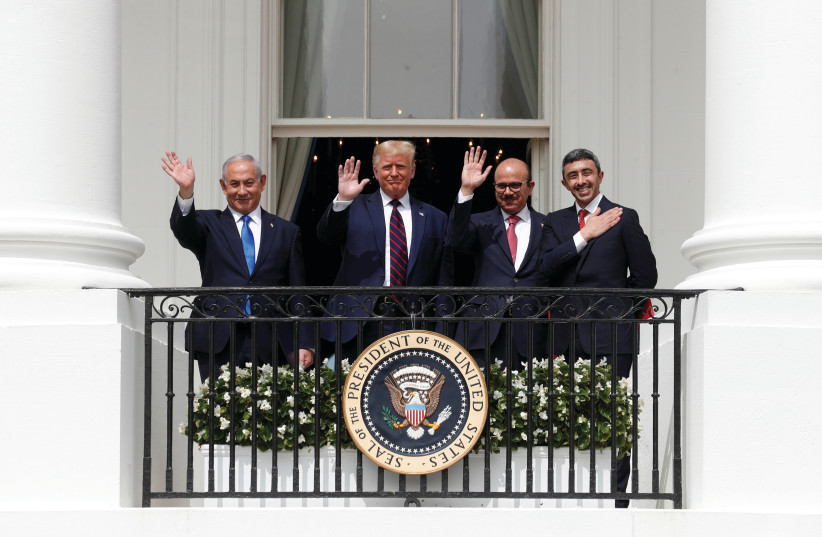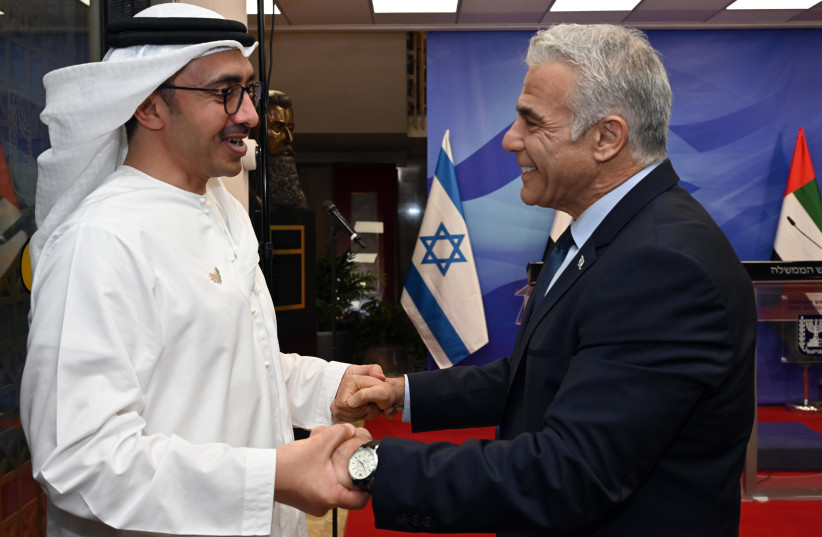Abraham Accords stronger than ever, two years later – editorial

Abraham Accords stronger than ever, two years later – editorial
The signing of the Abraham Accords two years ago marked the start of a positive relationship for the benefit of all; like all relationships, there must be an effort to maintain it.

This week marked the second anniversary of the Abraham Accords, under which Israel signed normalization agreements with the United Arab Emirates and Bahrain, which were later extended to Morocco.
Skeptics at the time noted that Israel had not been at war with these Arab Muslim states and downplayed the idea that the accords – reached under the Trump administration and Netanyahu government – could be called “peace treaties.”
But their importance should not be underestimated. The Abraham Accords marked a strategic diplomatic shift for Israel and the region and the relationships with the countries has flourished beyond even optimistic expectations.
As the UAE minister of state for foreign trade Thani Al Zeyoudi wrote in an opinion piece in yesterday’s Jerusalem Post, “It was a moment that changed the course of history. On the bright, sunlit morning of September 15, 2020, when Abdullah bin Zayed al-Nahyan, foreign minister of the UAE; Israel’s prime minister Benjamin Netanyahu; and Abdullatif bin Rashid al-Zayani, foreign minister of Bahrain, held aloft signed copies of the Abraham Accords in front of the White House, it signaled not simply the end of 48 years of hostility and distrust but the beginning of a new political and economic era for our region.
“It was a moment that changed the course of history. It signaled not simply the end of 48 years of hostility and distrust but the beginning of a new political and economic era for our region.”
UAE minister of state for foreign trade Thani Al Zeyoudi

“In establishing full diplomatic relations, the UAE, Bahrain and Israel had chosen prosperity over politics, cooperation over isolation, opportunity over suspicion. Everyone present on the South Lawn understood the magnitude of the occasion – and its potential to elevate the lives of people across the Middle East in the decades to come.”
What about today?
Today, it seems natural that a minister from a Gulf state would write in The Jerusalem Post praising the relations between the countries, but we need to remind ourselves that it was not always obvious. Similarly, to mark the anniversary, Prime Minister Yair Lapid yesterday hosted the UAE Minister of Foreign Affairs and International Cooperation at the Prime Minister’s Office in Jerusalem. It is important to note that although the administration and government in the US and Israel changed in the meantime, the accords hold firm, as seen, for example, in the so-called Negev Summit earlier this year. This is the mark of true treaties between countries rather than agreements between leaders.
How does this fit on the timeline of Israel’s history?
The contrast between the Abraham Accords and the Oslo Accords, signed 29 years ago this week, could not be stronger. The Abraham Accords are based on a genuine desire by all parties to create peace and prosperity for all those involved. The accords also mark the acceptance of Israel’s existence. The Jewish state is part of the region and here to stay. Far from being an enemy, Israel can contribute in many cutting-edge fields.
Despite the challenges of the COVID-19 pandemic that rocked the entire world and the surge in Palestinian violence, the accords have proven successful in every sphere from economics, finance and tourism to defense ties.
As Al Zeyoudi noted, the UAE-Israel relationship has been so successful that it was agreed to pursue a new multi-level trade deal, The UAE-Israel Comprehensive Economic Partnership Agreement (CEPA) which is set to come into force in the coming weeks, further opening market access and creating new opportunities in growth industries such as healthcare, agri-tech and advanced technology.
The accords have also helped improve ties, official and unofficial, with other countries in the region and beyond. During US President Joe Biden’s recent visit, for example, an unusual summit of countries dubbed the I2U2 group took place with the participation of India, Israel, the UAE and the US. And it was widely reported that for the first time there were direct flights from Tel Aviv to Riyadh in Saudi Arabia, the next stop on the president’s itinerary.
It is true that the basis of the accords was the common need to confront similar threats such as Iran’s nuclear aspirations and the dangers of Islamist extremists, but the end result has brought about so much more.
The signing of the Abraham Accords two years ago marked the start of a positive relationship for the benefit of all; like all relationships, there must be an effort to maintain it. More work is needed also to expand it. The past two years have shown us the way to a better future, together, in peace – cause for celebration, indeed.





